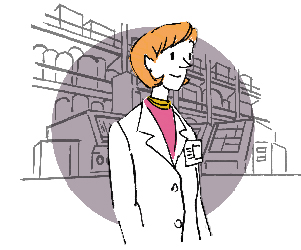Members of the public, patients, healthcare professionals (HCPs) and AI developers are the focus of our research
The AIDE Project is a space in which everyone involved with healthcare can contribute to this research on an equal footing.
Below we have listed some current issues in healthcare which can be resolved by AI, and some issues that should be addressed when developing and implementing AI.
Issues from the perspective of citizens and patients

- The wait times are long for medical examinations
- Doctors are always focused on their computer screens making notes and it is difficult to talk to them
- I have symptoms but can not get an accurate diagnosis
- There is no appropriate treatment for my condition
Issues from the perspective of HCPs

- It takes time to enter information into electronic medical records and so I cannot focus on my patients
- It is sometimes difficult to make a definitive diagnosis from diagnostic images
- When explaining a health condition to a patient, I find myself relying too much on technical jargon
- I am struggling to deal with rare diseases for which no treatment has been developed
Issues from the perspective of AI developers

- I don’t know if AI technology is easy for healthcare professionals to use or will be acceptable
- I don’t know how patients will feel about the technologies when they come into contact with them
- The expectations from healthcare professionals and patients that AI can do anything exceeds what is really possible
Initiating dialogue between stakeholders on an equal footing
Until recently, it was generally the doctor and allied HCPs who made decisions about treatments and reported on treatment outcomes. However, there has been a general trend towards patient-centered care where the relationship between physician and patient is seen as one of equal partnership with shared decision making. Patient quality of life measures (QOL) and patient reported outcomes (PRO) are now seen as important measures of the success of treatments. Ideas such as joint decision-making between patients and healthcare professionals, patient-centered care, and patient involvement are recognized as ways to create better outcomes.
The patient is an expert in their own condition. By allowing their direct input into the decision making process the finite resources of health care systems can be used more effectively, appropriately and produce higher levels of satisfaction.
Mutual acceptance and trust through communication on an equal footing is indispensable in modern healthcare.
The AIDE Project asks not only for the opinions of stakeholders (patients, members of the public, healthcare professionals, and developers) on AI in healthcare, but also on the progress of the AIDE Project itself and its results. By providing opportunities for stakeholders to be involved, it represents a new way of doing research in healthcare.
We welcome members of the public and patients to participate in the AIDE Project and, on equal footing with other stakeholders, learn about, consider, and discuss AI technologies in healthcare that will have an impact on your life.
Details about opportunities to get involved will be shared through our website.
Knowledge that forms the basis of dialogue
Dialogue requires shared knowledge. We will move together towards the shared goal of improving healthcare through new technologies.
To achieve this, the AIDE Project will also develop activities to share knowledge and information about AI in healthcare with people in varied positions.
We have shared a glossary for our frequently used terms on this site.
